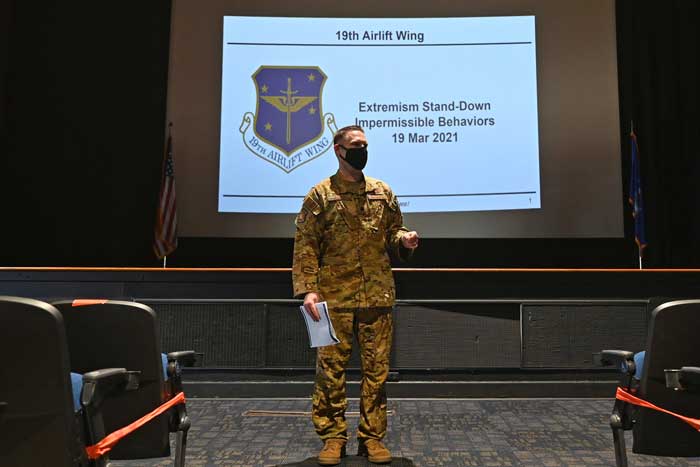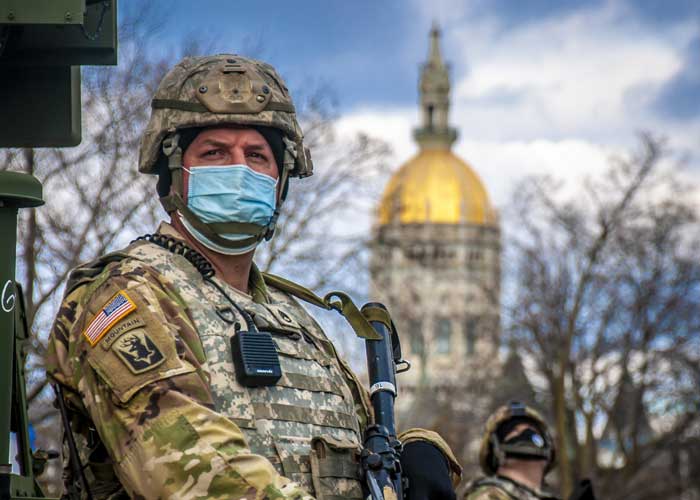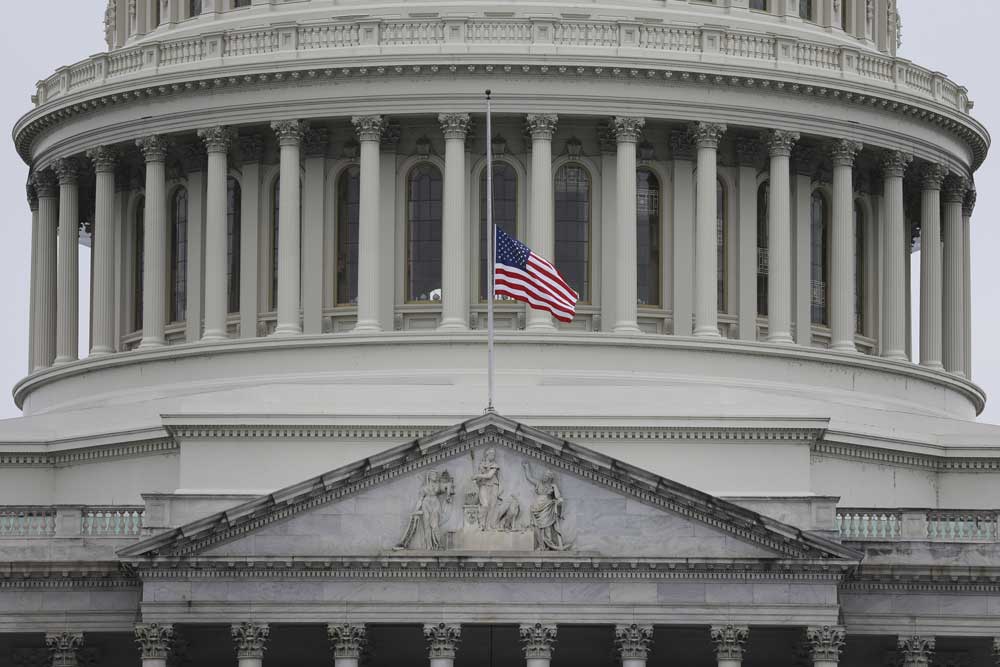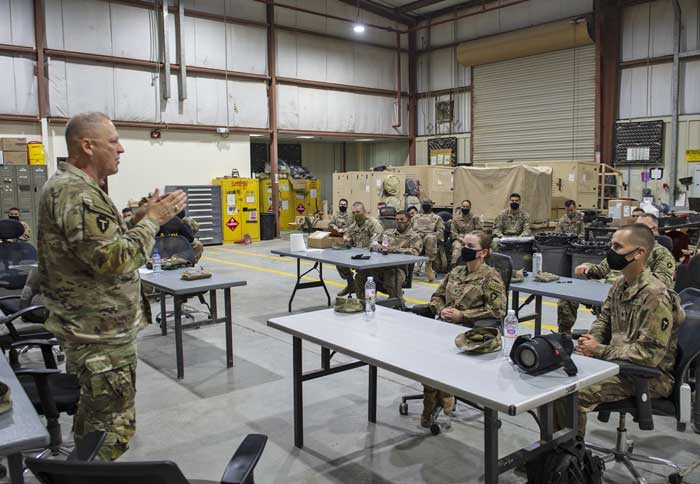Most Veterans Who Support Extremism Had Negative Military Experiences, Study Finds
In interviews, nearly three-quarters of veterans who said they supported an extremist group or ideology reported experiencing a traumatic or otherwise negative event during their military service, according to a study released today by the RAND Corporation. And more than half of the veterans interviewed said they struggled with the transition to civilian life, with difficulties including homelessness and incarceration.
The study is the first qualitative analysis seeking to understand how veterans’ experiences may play a role in support for radical ideologies. While the sample size is small, researchers hope it will provide direction for further research into how Americans who swore to uphold and defend the Constitution may become enamored with hateful or anti-government rhetoric.

Lt. Col. Ryan Polcar, 19th Airlift Wing director of staff, during the Extremism Stand-Down Day at Little Rock Air Force Base, Arkansas, March 19, 2021. Photo by Tech. Sgt. Dana J. Cable, courtesy of the U.S. Air Force.
“It’s very hard to sort out what it is about the veteran experience, the military experience, if anything, that’s truly unique,” says Ryan Brown, the lead author of the study. “Is there anything unique about or specific about the veteran experience that may lead to a different type of involvement [with these groups]?”
The report comes at a time when the issue of veteran and active military involvement in extremist groups has become increasingly politicized. The prevalence of rioters with military backgrounds at the Capitol building on Jan. 6 drew national attention to the issue, and Defense Secretary Lloyd Austin ordered a one-day stand-down, or a pause in operational training, to discuss extremism in the ranks in 2021, as well as a working group to address the problem.
But many of the working group’s recommendations remain unfunded and unimplemented following Republican pushback in Congress. A Pentagon report determined that dozens of active-duty troops supported terrorism, political violence, or overthrowing the government in the past year. But a study by the Institute for Defense Analysis released in December found no evidence that violent extremism is a bigger problem in the military than in the nation at large.
The RAND analysis builds on another RAND report released last fall, which also found no evidence that the veteran community supports violent ideologies at higher rates than the general population.

A soldier assigned to the Connecticut National Guard stands guard in Hartford, Connecticut, Jan. 17, 2021. At the request of the governor, the National Guard was called up to assist local, state, and Capitol police following an FBI advisory issued in the wake of the events of Jan. 6 in Washington, D.C. Photo by Timothy Koster, courtesy of the Connecticut National Guard.
But Brown, who was also an author of the study released last fall, said that while the numbers of veterans involved in extremist movements may not be disproportionate, the impact of that support can be. An analysis from the National Consortium for the Study of Terrorism and Responses to Terrorism at the University of Maryland last year found that extremist crimes committed by people with military backgrounds are nearly two times more likely to be “successful” mass casualty events, in which the intent was to kill or injure 4 or more people.
“While veterans may not be overrepresented necessarily in extremism attacks, they’re overrepresented in more successful attacks,” Brown says. “So is there something about that pathway that leads to greater commitment to these groups, if you do get recruited?”
* * *
Veterans and service members have continued making headlines for radical rhetoric and actions in recent years. Arrests for the Capitol insurrection are continuing, but current estimates of rioters with military backgrounds hover between 14.5% and 17%. The percentage of American adults who have served in the military is about 6%. A 2021 leak of the Oathkeeper’s membership roster revealed at least 128 service members, and the Anti-Defamation League’s Center on Extremism, which analyzed the roster, estimates that an additional 3,800 veterans were members of the group.
Award-Winning Journalism in Your Inbox
In 2020, Steven Carrillo, an active-duty sergeant in the Air Force, shot and killed two law enforcement officers as part of the Boogaloo movement, a far-right anti-government group that wants to incite civil war.
Jack Texeira, the airman convicted this spring of leaking classified information on Discord, was twice denied a gun permit after making violent, racist threats; the Washington Post released video of him using antisemitic slurs at a shooting range.
And just last month, the 20th Special Forces Group, an Army National Guard unit, posted on Instagram a photo of one of its soldiers wearing a patch depicting a Nazi SS death skull. The Army said the incident is under investigation.

The U.S. flag at the Capitol building flies at half-staff for fallen Capitol Police officer Brian Sicknick on Jan. 11, 2021, after the insurrection at the Capitol on Jan. 6, 2021. Photo by Staff Sgt. Devlin Drew, courtesy of the U.S. Air National Guard.
“When somebody dedicates their lives to defending the United States, to defending the Constitution, to defending the people of this nation, you certainly would expect that that number would go dramatically down,” said Patrick Riccards, the executive director of Life After Hate, which helps people leave violent extremism, about supporting of hateful ideology.
“We should be shocked about the general population,” he said.
“We certainly should be shocked that that same number holds in the military.”
While most attention to the issue of extremism in the military community has focused on far-right ideologies, the RAND study surveyed veterans who expressed support for a range of groups and beliefs, from QAnon and the Proud Boys to antifa and Black nationalists.
Brown noted that right-wing extremism is more prevalent among veterans than extremist left-wing ideologies—people in the military community who have committed criminal extremist acts tend to favor white supremacist and anti-government rhetoric, according to data from the National Consortium for the Study of Terrorism and Responses to Terrorism. Other research from the consortium has shown that far-right extremists generally are significantly more likely to enact violence than those on the far left.
Among participants in the RAND study, nearly half expressed some support for political violence—all on the politically right side of the spectrum. But the study focused on veterans who had expressed support for radical groups or beliefs, not those who had enacted violence. Brown said looking at a range of ideologies is important as researchers try to understand why some people may become susceptible to extremist propaganda, noting they had seen cases where people moved from one side of the political spectrum to the other.
“Ideology seems to be just a layer on top of this underlying drive to be really involved in the thick of something that’s important and secret, and may need violence and so forth,” Brown says. “It’s like the ideology is almost irrelevant to what the extremist activity is feeding.”
* * *
Extremist groups have long preyed on people leaving military service. These groups gain legitimacy from having veterans among their ranks, and they know that veterans may struggle as they transition to civilian life, making them potentially more vulnerable to recruitment.
Less than half of all veterans in the country were enrolled in VA health care in 2021. Some are not eligible for coverage; confusion about enrollment procedures or eligibility requirements can also prevent veterans from signing up. Similarly, only about half of veterans who need mental health care receive it, either through the VA or privately. Close to 30% of veterans of post-9/11 wars have experienced PTSD at some point in their lives, and people who have served in the military have a 57% higher risk of suicide than those who have not served.
“Radicalized groups are very good at convincing people that their strategies or their tactics are the way to alleviate their suffering,” says Rebecca Nowatchik, the director of external partnerships at the Secure Families Initiative, a military families advocacy group.
A majority of respondents in the RAND study talked about difficulties they encountered during their time in the military, such as multiple deployments, combat trauma, or frustrations with military bureaucracy—unexpected transfers or discharges, for example. The study respondents also discussed missing the camaraderie of the military after they separated, and struggling with money issues, along with depression, post-traumatic stress, or substance abuse.

Maj. Gen. Patrick Hamilton attends class on extremism in the ranks led by Lt. Col. David Green, staff judge advocate, 36th Infantry Division, in the motor pool at Camp Arifjan, Kuwait, Mar. 18, 2021. Photo by Staff Sgt. Mark Scovell, courtesy of the U.S. Army.
Brown cautions against drawing causal connections from the interviews—the sample size is small, and the study did not include a comparison with veterans who do not endorse extremist ideologies. But he said that understanding the often amorphous challenges that veterans can face is an important component of learning how to support them.
“I do think that the transition away from highly institutional, highly—often, not always, but often—highly social-bonded, intensely meaningful experience as part of the military, to suddenly being on your own is a particular period of vulnerability,” Brown says. “This study reinforces a lot of the lessons we sort of knew already, that these adaptation experiences can be difficult. They lead to negative outcomes. But it does suggest that extremism can be one of those outcomes.”
That period of vulnerability doesn’t necessarily have an expiration date.
“Those issues, like with mental health or substance use or just any sort of psychological process or social process, there’s years of exposure to the difficulty of transition,” Brown says.
Nowatchik agreed. “People who are suffering need meaning. They’re searching for meaning for their suffering,” she says. “We see radicalization happening when the suffering of an individual is weaponized.”
Our Journalism Depends on Your Support
Part of helping those veterans who are susceptible to extremist targeting is not just working to address their suffering but also helping them make meaning in other ways. Riccards points to the importance of connection for veterans looking to leave extremism.
“So much of it is because they feel disconnected from civil society,” Riccards said. “They don’t believe that people understand. They don’t believe that they fit in.”
He added, “It becomes important for individuals to hear from those who have literally walked in the same combat boots as them, who have experienced the same thing, who have dealt with the same struggle, and who have come out on the other side.”
This War Horse feature was reported by Sonner Kehrt, edited by Erica Goode, fact-checked by Jess Rohan, and copy-edited by Mitchell Hansen-Dewar. Abbie Bennett wrote the headlines. This story was produced with support from the Rosalynn Carter Fellowship for Mental Health Journalism.





Comments are closed.